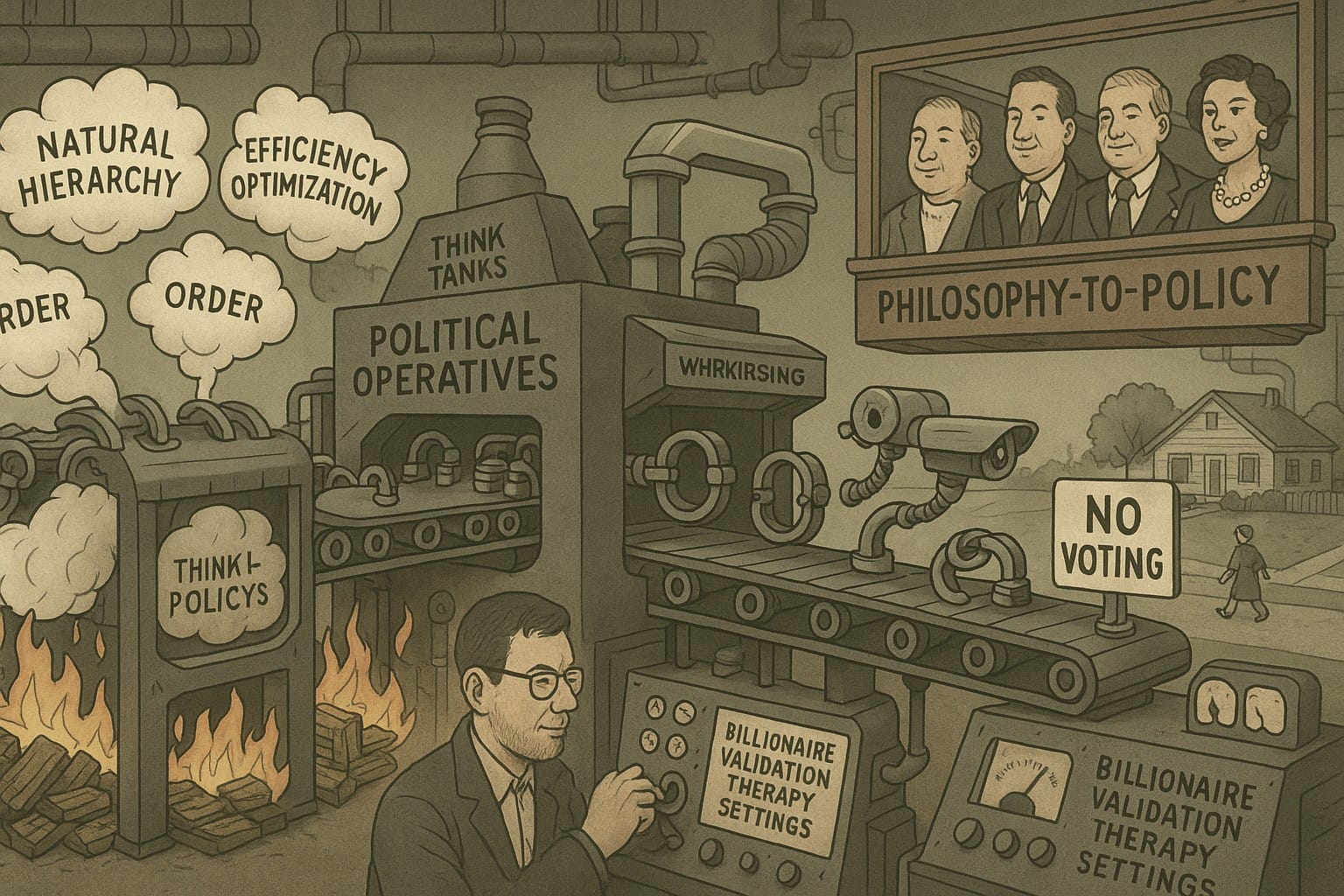A Guide to Intellectual Grifting 🎭
Or: How Curtis Yarvin Turned Flattery into a Political Movement

Picture this: You're a socially awkward programmer who got stupidly rich because you built the right app at the right time. Deep down, you suspect that your success was mostly because of luck and market timing. But what if—and hear me out—what if someone told you that you're a misunderstood genius whose wealth proves you're evolutionarily superior to the democratic masses?
Welcome to the most lucrative academic discipline never taught in universities: Billionaire Psychology 101.
Our star pupil? Curtis Yarvin, who cracked the code on something marketing executives have known forever: people will pay obscene amounts of money to hear elaborate justifications for why they're special. Yarvin just scaled this insight to "designing political systems that make my rich patrons feel like philosopher-kings."
The Yarvin Method: When Flattery Meets Philosophy
Here's what makes Yarvin's approach so devastatingly effective—he didn't accidentally stumble into becoming Silicon Valley's house philosopher. This was precision targeting at its finest. He identified the perfect psychological vulnerability in tech billionaires: that uncomfortable intersection where Imposter Syndrome meets God Complex.
Think about it. These are people who revolutionized human communication by... making us all stare at our phones more. They "disrupted" transportation by... putting taxis on an app. And they've been told they're visionaries for essentially digitizing things humans were already doing. Their egos are primed for this kind of intellectual steroids.
So Yarvin shows up with what amounts to the intellectual equivalent of a participation trophy for megalomaniacs, except this trophy comes with a whole political philosophy attached.

The Five-Step Formula for Philosophical Sycophancy
Now, you might wonder: how does one transform simple ego-stroking into a coherent political philosophy? Yarvin's approach isn't random flattery—it's strategic psychological manipulation disguised as intellectual discourse. Let's break down his method, because honestly, it's kind of brilliant in its cynical precision.
Step 1: Reframe Their Luck as Destiny
The core anxiety plaguing every tech billionaire is the nagging suspicion that their success was mostly timing and circumstance. Sure, they worked hard, but so did millions of other people who didn't happen to be building social networks when venture capital was flowing like water. This is where Yarvin's genius shines.
Instead of dismissing this anxiety, he transforms it into validation. Those weren't lucky breaks—they were destiny revealing itself! According to the Yarvin framework, these individuals represent the "natural evolution of human leadership." Democracy isn't working because it prevents these evolved beings from exercising their inherent superiority. Suddenly, that uncomfortable feeling about getting rich from an app that rates women becomes evidence of being chosen by history itself.
The psychological relief this offers is intoxicating. As one billionaire probably didn't say but totally should have: "I always suspected I was special, and now I have a political theorist to prove it!"
Step 2: Transform Antisocial Tendencies into Intellectual Insights
Here's where Yarvin's background in tech culture pays dividends. He understands that many tech moguls are fundamentally uncomfortable with democratic processes—all that messy compromise, those inefficient debates, the need to convince people instead of just implementing changes unilaterally. In normal circumstances, we might call this "authoritarian personality disorder."
But Yarvin? He calls it efficiency optimization.
Their impatience with democratic institutions isn't a character flaw—it's philosophical insight! Their preference for top-down control isn't about ego—it's about understanding hierarchical systems! It's like having a therapist who tells you all your worst impulses are signs of genius. Which, come to think of it, is exactly what this is.
Step 3: Add Historical Seasoning for Intellectual Credibility
Nothing makes a billionaire feel more legitimate than being compared to historical figures who were also rich and powerful. Yarvin's approach here is particularly clever—he doesn't just pick any historical references. He chooses figures like Marcus Aurelius, Caesar, and Machiavelli: people who were simultaneously powerful, intellectual, and (this is key) widely admired by history despite their authoritarian tendencies.
The beauty is that it doesn't matter if the comparisons make any actual sense. The goal isn't historical accuracy—it's making your target feel like they're part of a grand tradition of philosopher-kings rather than just really successful app developers who got lucky during the dot-com boom.
Step 4: Create the Perfect Enemy
This might be Yarvin's most psychologically sophisticated move: inventing "The Cathedral"—a supposedly shadowy network of academics, journalists, and cultural elites who are conspiring against his brilliant billionaire clients.
This is genius for several reasons. First, it makes them feel like heroic underdogs, despite being the most powerful people on Earth. Second, it explains why their ideas aren't universally celebrated requiring no self-reflection. Third, it justifies extreme measures against democratic institutions as necessary defensive actions.
It's like a conspiracy theory designed explicitly for people who need to feel both victimized and superior simultaneously. The Cathedral becomes this perfect boogeyman that validates every paranoid impulse while making authoritarian responses seem reasonable.
Step 5: Make Them the Heroes of History's Biggest Story
The final ingredient in Yarvin's philosophical cocktail is scope. He doesn't just tell billionaires they're smart or successful—he positions them as humanity's salvation. Democracy is failing, civilization is collapsing, and only a bold return to CEO-style leadership can save us all.
This isn't just about politics anymore—they're helping to design the governmental operating system that will guide human civilization for centuries. Talk about a compelling origin story for your inner megalomaniac.

From Philosophy to Paychecks: The Business Model
Now that we've dissected the psychological mechanics, let's talk about how Yarvin transformed this insight into what might be the most profitable intellectual grift in human history. Because make no mistake—this isn't just about ideas. This is about turning megalomania into a sustainable income stream.
The beauty of Yarvin's approach is that he didn't start by trying to become an influencer or build a massive following. Instead, he recognized something that every successful consultant knows: it's better to have one billionaire client than a million broke followers. And billionaires, as it turns out, are surprisingly easy to flatter if you know what buttons to push.
Phase 1: Build Your Intellectual Brand
Yarvin's first move was classic: create a platform that sounds impossibly sophisticated while delivering content that's essentially "Rich People Should Rule Everything: The Intellectual Edition." He launched his Substack with the delightfully pretentious name "Gray Mirror"—because nothing says "serious political philosopher" like mysterious metaphors about reflective surfaces.
The genius here is in the presentation. Yarvin doesn't write blog posts—he crafts "lengthy philosophical meditations." He doesn't have opinions—he develops "theoretical frameworks." It's the same way management consultants turn "maybe try working harder" into "implementing synergistic optimization protocols to maximize operational efficiency vectors."
Phase 2: Strategic Patron Acquisition
Here's where Yarvin's background in Silicon Valley culture paid off. He understood tech billionaires aren't just rich—they're rich and deeply insecure about their intellectual legitimacy. They've been told they're changing the world by optimizing ad delivery algorithms, but they secretly worry they're just really successful at digital manipulation.
Enter Yarvin at exactly the right parties, with exactly the right combination of intellectual confidence and strategic flattery. And once you land that first major patron—Peter Thiel, in Yarvin's case—the network effects kick in. Rich people love nothing more than competing over who has access to the most exclusive intellectual content.
It's like having a personal trainer, but for your ego, and the workout consists entirely of exercises designed to make you feel more important than you already thought you were.
Phase 3: The Political Integration Jackpot
But Yarvin's absolute masterstroke was getting his ideas cited by actual politicians. When J.D. Vance started name-dropping him on podcasts, Yarvin achieved something most philosophers can only dream of: watching his elaborate flattery scheme become actual policy.
Think about the psychological satisfaction here. You started by telling billionaires they should run everything; they funded your lifestyle for saying so, and now their political protégés are implementing your suggestions in government. It's like being paid to design your own echo chamber and then watching it become reality.
This is where the grift transcends mere intellectual prostitution and enters the realm of genuine political influence. Yarvin isn't just making money off billionaire insecurities anymore—he's helping shape the governmental philosophy of people with actual power.
The Psychological Genius Behind the Grift
What makes Yarvin's approach so devastatingly effective isn't just the flattery—it's the specificity of the flattery. Anyone can tell a billionaire they're smart. Yarvin created an entire philosophical framework that makes their wealth, their antisocial tendencies, and their authoritarian impulses seem like evidence of evolutionary superiority.
It's like astrology for sociopaths: detailed enough to seem credible, flattering enough to be addictive, and vague enough to apply to anyone with enough money and ego to need this kind of validation.
But there's something even more sophisticated happening here. Yarvin understands that his target audience doesn't just want to be told they're great—they want to feel like misunderstood visionaries. The whole "Cathedral" conspiracy theory feeds directly into their existing persecution complex. Despite being the most powerful people on Earth, they get to feel like brave rebels fighting against an entrenched system.
It's therapeutic role-playing for people who have everything except the one thing money can't buy: the certainty that they deserve it all.
The Warning Signs: Recognizing Billionaire Flattery Philosophy
Red Flags to Watch For:
- Excessive Historical Name-Dropping: When someone compares tech CEOs to Roman Emperors, they're probably selling something
- Democracy Skepticism Disguised as Efficiency Concerns: "The system is too slow/messy/democratic" often means "I want to be in charge"
- Evolutionary Language: Phrases like "natural aristocracy" or "fitness to lead" are usually cover for old-fashioned elitism.
- Conspiracy Theories About Academia/Media: Creating phantom enemies to justify extreme measures
- CEO Worship: Treating business success as evidence of general wisdom or moral authority
The Real Practical Takeaway
The Yarvin phenomenon isn't just a curiosity—it's a warning about how intellectual frameworks can be weaponized to legitimize authoritarian impulses. When you see someone creating elaborate philosophical justifications for why rich people should have more power, ask yourself:
Who benefits from this idea? (Hint: Usually, the people funding the philosopher)
What democratic institutions does this threaten? (Usually all of them)
Is this solving problems, or just flattering the people with the money? (You can guess)
Remember: The best way to recognize a grift is to follow the money and the ego. Suppose a philosophy makes billionaires feel like misunderstood geniuses while advocating for systems that give them more power. In that case, you're probably looking at the world's most expensive form of intellectual validation therapy.
I don't sell memberships or anything, but if you want to buy me a beer, I won't refuse.


